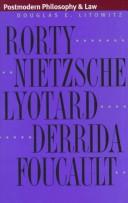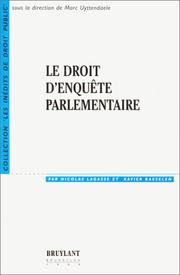| Listing 1 - 2 of 2 |
Sort by
|

ISBN: 0700608575 0700609997 9780700609994 9780700608577 Year: 1997 Publisher: Lawrence, Kan. University Press of Kansas
Abstract | Keywords | Export | Availability | Bookmark
 Loading...
Loading...Choose an application
- Reference Manager
- EndNote
- RefWorks (Direct export to RefWorks)
Now that contemporary scholars have begun to extend postmodern theory to law, an appraisal of its relevance in that sphere is especially important. This book offers a critical introduction to writings on law by key postmodern philosophers--Nietzsche, Foucault, Derrida, Lyotard, and Rorty--and articulates the strengths and weaknesses of postmodern legal theory. Douglas Litowitz takes a critical stance on these thinkers and determines that postmodern philosophy falls short of a positive jurisprudence--a vision of a just state and a moral legal system--because it takes an unduly external perspective on the law and espouses an unworkable anti-foundationalism. The postmodernist perspective, he argues, is too removed from our legal practices to resolve legal problems like abortion, flag burning, or pornography. Litowitz shows that postmodernism is so far removed from the language games in which lawyers and judges decide key legal issues that it leaves the internal practice of law untouched, and its radical rejection of foundations precludes a position from which a just legal system might be built. Still, postmodernism can make a significant contribution to legal theory by showing the limits of existing arrangements, focusing attention on genealogy and discourse, and empowering those who have been denied a voice under the legal system. Postmodern Philosophy and Law bridges the gap between Anglo-American jurisprudence and postmodern theory by discussing not only traditional approaches such as natural law theory and legal positivism but also continental philosophy and critical legal studies. It is the first book to expound and critique postmodern legal theory and its ramifications for a mainstream audience of legal scholars and philosophers.
Droit et politique --- Filosofie van het postmodernisme --- Law and politics --- Philosophie postmoderniste --- Postmodernism --- Postmodernisme --- Postmodernisme (esthétique) --- Postmodernisme (filosofie) --- Postmodernisme (philosophie) --- Recht en politiek --- Law --- Philosophy --- Political aspects --- Legal theory and methods. Philosophy of law --- Lyotard, Jean-François --- Derrida, Jacques --- Foucault, Michel --- Nietzsche, Friedrich --- Rorty, Richard --- Law - Philosophy --- Law - Political aspects

ISBN: 280271130X 9782802711308 Year: 1998 Volume: *3 Publisher: Bruxelles Bruylant
Abstract | Keywords | Export | Availability | Bookmark
 Loading...
Loading...Choose an application
- Reference Manager
- EndNote
- RefWorks (Direct export to RefWorks)
Public law. Constitutional law --- Belgium --- Droit et politique --- Droit public --- Instellingen --- Institutions --- Law and politics --- Publiek recht --- Recht en politiek --- Governmental investigations --- -#SBIB:323H22 --- 342.53 <493> --- #A9901A --- Commissions of inquiry --- Executive investigations --- Government investigations --- Investigations, Governmental --- Judicial investigations --- Legislative investigations --- Investigations --- Justice, Administration of --- Legislation --- Legislative bodies --- Legislative oversight --- Public administration --- Belgische politieke instellingen: parlement --- Law and legislation --- Committees --- #SBIB:323H22 --- Legislators --- Legal status, laws, etc. --- Governmental investigations - Belgium --- Droit constitutionnel --- l'enquête parlementaire --- législation --- les Chambres fédérales --- autorités judiciaires --- le Parlement --- commissions d'enquête --- l'article 56 de la Constitution --- le droit d'enquête
| Listing 1 - 2 of 2 |
Sort by
|

 Search
Search Feedback
Feedback About UniCat
About UniCat  Help
Help News
News